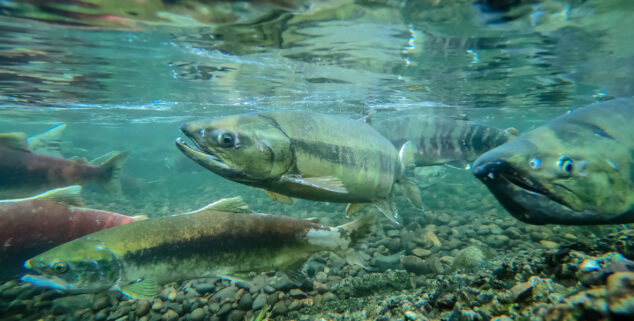Opinion
How protecting Central Valley communities from flooding can help restore the Bay-Delta and salmon
 Image by ChristinaPrinn
Image by ChristinaPrinnOPINION – The San Francisco Bay-Delta ecosystem is in deep trouble. Salmon runs are declining. Salmon fishing has been completely closed in 2023 and 2024 for only the second time ever. A growing list of fish are in danger of extinction. Harmful algae blooms are proliferating. All evidence points to a lack of freshwater flows as a primary cause.
We need to take action to protect the largest estuary on the West Coast, as well as those who suffer as the environment declines, including Delta communities, Tribes, and salmon fishermen. But the two traditional pathways to leave more water in our declining rivers are struggling.
The first path is a traditional regulatory approach. In December of 2018, the State Water Resources Control Board set – but is not yet enforcing – new standards to improve flows on San Joaquin River tributaries. Water users have tied up this effort through political pressure and lawsuits. Today, the Water Board seems most uncertain when it comes to Bay-Delta issues.
The second path is a negotiated solution. Water users and the Governor have proposed “Voluntary Agreements” to address the growing Bay-Delta crisis. But environmentalists, Tribes, and others have mostly not been included in these talks. The current proposal is lacking multiple perspectives, thus flawed. And lengthy and costly negotiations have still not produced a complete proposal after more than a decade of work.
Is there a third path? There might be – and it has the added benefit of reducing the growing flood risk in the Central Valley.
In recent years, the scientific community has warned that climate change will increase peak flows on the San Joaquin River by as much as five fold, dramatically increasing the risk of catastrophic flooding. A large Central Valley flood could result in the widespread loss of life. The economic cost could be staggering – as much as $1 trillion.
The Central Valley Flood Protection Board has adopted a new Central Valley Flood Protection Plan to respond to this growing risk. A cornerstone strategy is to restore tens of thousands of acres of floodplains along Central Valley rivers. That will allow floodwaters to spread out and sink into groundwater aquifers – rather than threaten communities like Stockton.
So what does floodplain restoration have to do with leaving more water in Valley rivers?
When existing agricultural land is restored as native floodplain habitat, it no longer needs irrigation. Restored habitat consumes some water – provided through natural precipitation and river flows. But even so, restoring floodplains reduces net water use. That saved water can be dedicated to restoring rivers.
For the first time ever, the State Water Board is considering a petition to use Section 1707 of the Water Code to dedicate to the environment water saved through floodplain restoration at the Dos Rios State Park near Modesto – letting it flow down the San Joaquin River and through the Delta without being diverted. The water saved by this one project is modest – only a few thousand acre-feet. But the amount that could be generated through the restoration of tens of thousands of acres of floodplains is significant.
This water can go to the environment without reducing anyone’s water supply. Even better, this ecosystem restoration is an additional benefit of floodplain projects that are needed to protect communities from flooding.
This approach is not a silver bullet. Floodplain restoration and Section 1707 will not painlessly meet all the water needs of this vast ecosystem. But it might contribute enough to help narrow the disagreements. And turning down the heat in this classic California water war would help the State Water Board protect the Bay-Delta.
We can find more badly-needed water for the Bay-Delta ecosystem through an ambitious effort to restore Valley floodplains that also reduces flood risk. The State Water Board should approve the Dos Rios Section 1707 petition. And decision-makers should ensure that this approach is scaled up to squeeze all of the benefits we can from this win-win solution.
Rick Frank is Professor of Environmental Practice at the U.C. Davis School of Law. Julie Rentner is the President of River Partners, a leading NGO on Central Valley river restoration and flood management.
Want to see more stories like this? Sign up for The Roundup, the free daily newsletter about California politics from the editors of Capitol Weekly. Stay up to date on the news you need to know.
Sign up below, then look for a confirmation email in your inbox.

Leave a Reply